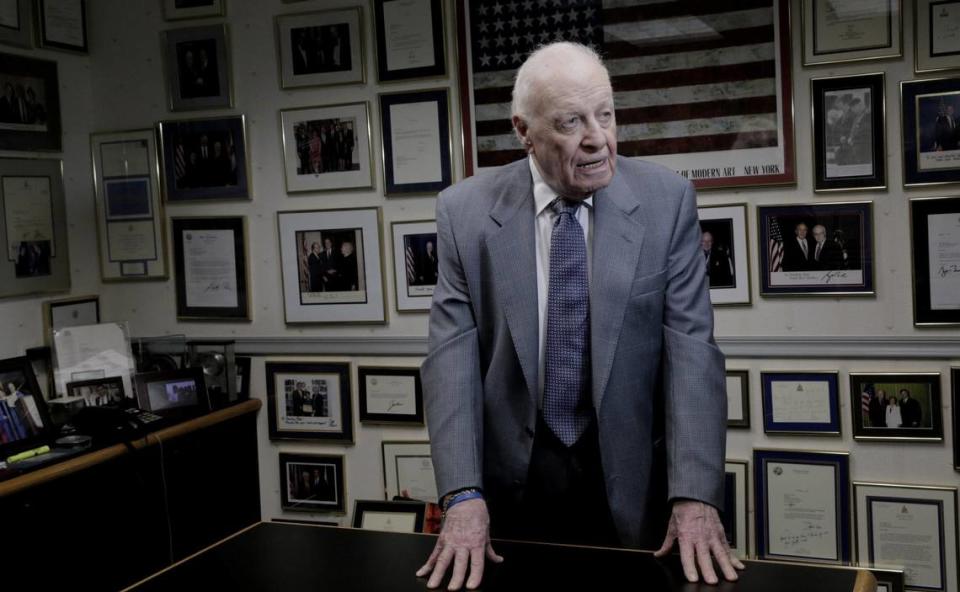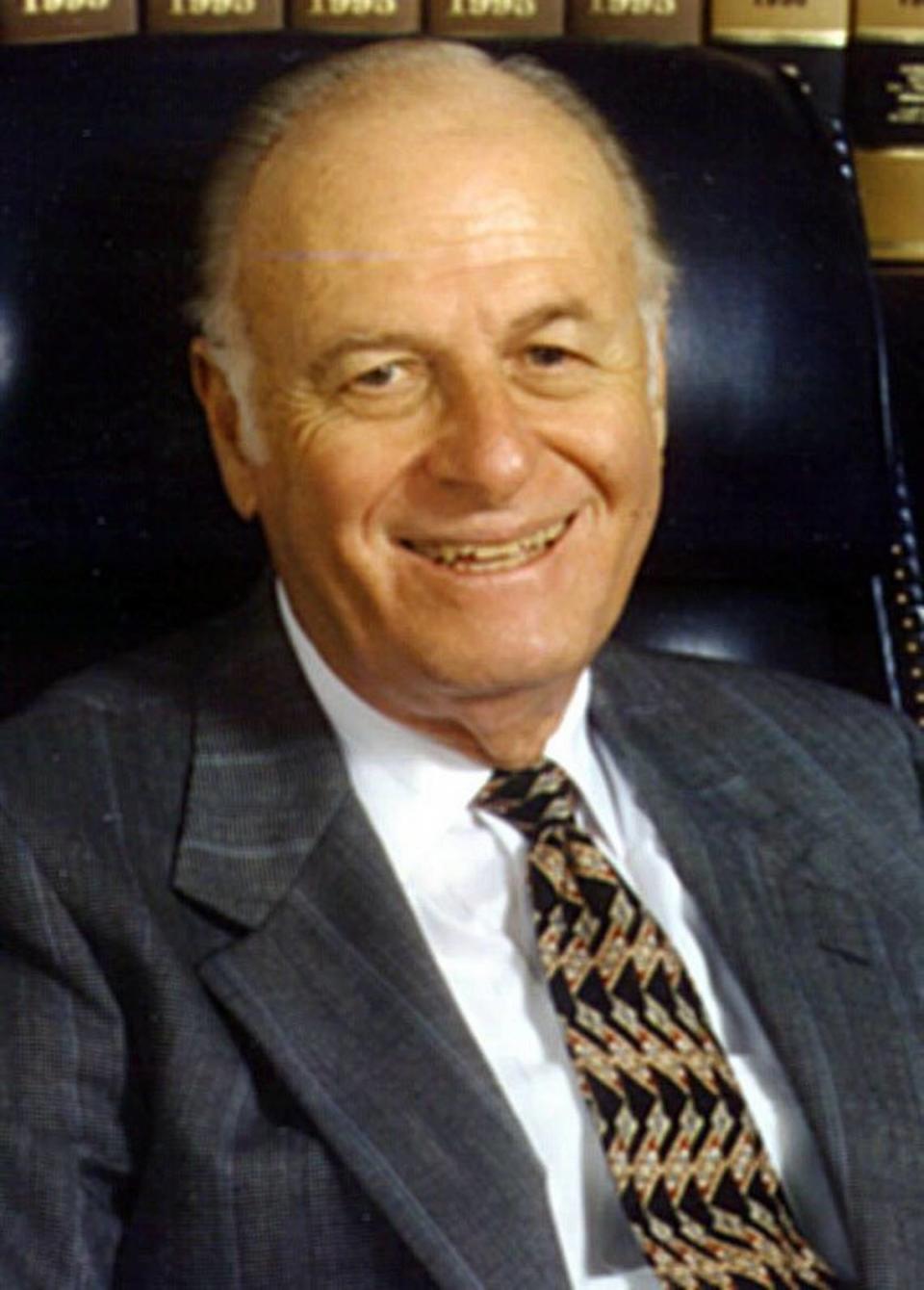A Miami builder and finance whiz helped you pay for college. Stanley Tate has died at 96
Stanley Graham Tate started life crammed into a one-bedroom Brooklyn apartment with his parents and two siblings, living what he called a “low-income lifestyle.”
While attending the University of Florida in Gainesville, he waited on tables for meals and tips.
Those hard early years influenced Tate’s business philosophy in Miami.
“I owe my success and my family’s stability to this community, which makes giving back a priority. Plus, giving back and supporting the next generation is the only way to ensure our city will one day reach its true potential,” he said in an interview in 2018.
Tate, who became a Miami real estate giant and founded Florida’s Prepaid College Plan, died on July 26 at age 96.
Tate was 90 and many decades into a multifaceted career when he looked back on the happenstances and decisions, the hits and the misses, that made him one of South Florida’s most successful and powerful men.
He was a developer who, since learning the business from his father-in-law, based his business empire in a building on 125th Street in North Miami. From those headquarters, starting in 1952, Tate built apartments, houses, condos, warehouses, office buildings, Burger King restaurants and shopping centers. He built them in Normandy Isles, Bay Harbor Islands, Kendall, Hialeah, Wynwood, throughout Miami-Dade and Broward, as well as in Texas and the Carolinas.
Sons Kenny and Jimmy now run Tate Capital, a firm that has redeveloped the Bahia Mar Resort Hotel and Marina in Fort Lauderdale, and over the years conducted investment business with Indian Trace Shopping Center in Sunrise and the 7300 Kendall Drive office building.
As the founder of the Florida Prepaid College Plan, Tate has helped hundreds of thousands students, many from lower-income families, attend a state school.
Tate, who also at one time owned the scandalous and sexy Studio 54 celebrity-magnet nightclub in Midtown Manhattan in 1981 after its previous owners went to prison on tax evasion charges, called his Prepaid College endeavor “the biggest single success I ever had.”
Florida Prepaid College Plan

The Florida Prepaid College Plan was designed and funded by Tate in 1987, with $600,000 of his own money, to help make higher ed affordable. Florida parents can pay in advance to lock in tuition rates from the time of their child’s birth to the point when they need the funds to pay for a state university or community college after their child’s high school graduation.
“The idea came from a desire to keep young talent from leaving the state and help underprivileged students unable to pay for continued education have something to strive for,” Tate had said.
At the beginning, Tate worked on the Prepaid College program alongside legislators including Sens. Ileana Ros-Lehtinen and Curtis Peterson.
Ros-Lehtinen said she and her husband, Dexter Lehtinen, bought the seventh and eighth contracts for their two children and that Florida Gov. Bob Martinez, his lieutenant governor and others in the Cabinet bought the first batch.
“When we created the program, Curtis and I had no idea that it would grow to be so hugely successful, thanks to the financial expertise of Stanley. There were some difficult years when the Florida Legislature raised the prices sky high but Stanley refused to go along with their plans,” Ros-Lehtinen said. “He successfully fought the Legislature and brought the price of the program to a much lower cost so that all families could realize the dreams of their children to go to college.”
Some schools were wary at first. Many applaud the program today.
“The Florida Prepaid College Plan is one of the reasons why Florida consistently ranks No. 1 in the nation in higher education,” said Natassia Martinez, director of Student Financial Services & Systems at Florida International University.
“Mr. Tate leaves a legacy of access to higher education that makes Florida stronger and more competitive. It allows families to plan and help make their students’ dreams a reality. Approximately 7,000 FIU students — and many more throughout the state — attend college every year supported by the Florida Prepaid College Plan,” she said.
Added North Miami Councilman Scott Galvin: “The impact of Mr. Tate’s Florida Prepaid plan can’t be overstated. Not only has it allowed generations of students to be able to attend university, it’s also allowed their parents the peace of mind to know they could afford it by locking in rates and guaranteeing investments.
“I admired him for not allowing politics to get in the way of the issues at hand. Whether the topic was at the local, state, or federal level, he sought and received support from across all parties. That’s how one knew his motivations were sincere. He wasn’t trying to advance his own agenda. He was simply trying to make the world better for all,” said Galvin, who is also executive director of Safe Schools South Florida, which offers support to LGBTQ students and teachers in Miami-Dade and Broward.
In 2006, Florida Gov. Jeb Bush signed a bill renaming the program the Stanley G. Tate Florida Prepaid College Program.
Resolution Trust Corporation
Tate had U.S. presidents calling on him to straighten out financial messes.
President George H.W. Bush, with whom Tate forged a close relationship, sought his counsel when the market crashed in the Savings & Loan financial crisis of the late ‘80s and early-1990s. As southeast regional director of the Resolution Trust Corporation, Tate helped resolve the issues. That was his second greatest accomplishment, he said.
“A well-thought-out plan to expedite the dissolution of all distressed real estate hitting the street and without too much governmental involvement was the underpinning premise of the Resolution Trust Corporation,” he told the Miami Herald in 2018. “Fortunately, we were incredibly successful.”
Political neophytes also tapped Tate for mentoring and guidance. The newly elected figured they could gain an advantage on managing their campaigns and time in office.
“Stanley was such a special person in my personal and political life,” Ros-Lehtinen, who represented Miami-Dade in Congress for nearly 30 years, from August 1989 to January 2019, said in an email interview with the Herald on Monday.
“Our friendship lasted decades. He was ever present in all of my congressional races and not only helped me greatly with fundraising but was a trusted advisor to me and to those in my inner circle. There wasn’t a decision made regarding my races where Stanley’s wise counsel was not sought and followed,” Ros-Lehtinen said. “He was a true mensch and he took great pleasure in helping others.”
Birth, Miami move and schooling
Tate, who was born in New York City on April 25, 1928, moved to Miami in the early 1930s when he was a toddler. “I suffered from rheumatic fever and so my parents sent me to live with my aunt and uncle in Miami where the climate was warmer,” he told the Miami Herald just after turning 90.
As a teen he worked in grocery stores while attending Miami Beach Senior High. He graduated from the University of Florida with a bachelor’s in statistical psychology.
“I felt that having a better understanding of social issues would help me,” he told the Herald in a 1993 interview.
In Gainesville, he met Joanne “Joni” Greenwood, a fellow student.
“After two or three dates, he told me he was going to marry me,” she told the Herald in 1993. “I laughed. I was 17 years old. But he was right. Stanley knows what he wants.”
The couple got married in 1949. She survives him. They raised three children together.
Tate and real estate

Joni’s father, Morton Greenwood, owned Royal Builders, a Miami-Dade County home builder, and brought in his new son-in-law to learn the real estate business. First, Tate served as a laborer and then a carpenter. “He taught me everything about the building business,” Tate told the Herald.
In 1950, Tate bought the company from his father-in-law. Two years later, he established Stanley Tate Builders and began building homes in Miami Beach and filled them with snowbirds who were looking to invest in the Sunshine State.
“Many people don’t know that minorities like Jews and African Americans were not allowed to live in many areas of Miami Beach, Indian Creek and Bal Harbour Village during the ‘40s, ‘50s and ‘60s, but these restrictions were what led us to build so many residences in Normandy Island and Bay Harbor,” Tate told the Herald in 2018.
His company grew to incorporate mortgage lending, development, property management and reviving failed real estate developments. In 2011, Tate Capital partnered with Jorge Pérez and Sergio Rok to buy the debt on the Omni International Mall and hotel on Miami’s Biscayne Boulevard and made $65 million from the sale of the asset’s debt to Genting Group, the South Florida Business Journal reported.
“Stanley Tate was an icon in the real estate industry, but never too busy to give back to the community,” Pérez, chairman and CEO of The Related Group in Miami, told the Herald in an email. “He pushed ahead to create one of the most important designs in college education, creating the prepaid college program that allows thousands of students of all incomes to attend our state universities. Plus, he was a great father, leaving his two outstanding sons, Kenny and Jimmy, to continue his real estate legacy.”
Foes and stumbles
President Bill Clinton, who succeeded the senior Bush, nominated Tate to become chairman of the Resolution Trust. But by that time in 1993, Tate had had enough of the Washington lifestyle. He felt he accomplished what he had set out to do with the Resolution Trust in the Bush administration.
Tate’s resignation letter to Clinton was pointed, Newsmax reported in a 2014 profile. “Mr. President, Washington is a vicious city, full of rumors, allegations, and accusations, without much, if any regard for truthfulness or factuality,” Tate’s letter read.
Years later, President Barack Obama called Tate to discuss a possible role for the businessman after the nation’s 2008 financial crisis. The two couldn’t come to terms. They had different philosophies, Tate said.
Tate had his own stint as an elected official — he was the second mayor of the Town of Bay Harbor Islands in the late-1960s to the early-’70s.
In a 2004 opinion column, former Miami Herald columnist Fred Grimm wrote of Tate: “This formidable force in Florida politics comes disguised as a 77-year-old man, kind and famously generous — the sort of do-gooder philanthropist who politicians think they can dismiss with a nice citizenship award. They don’t quite grasp that a pestering old businessman from South Florida could devour them.”
Tate was a past chairman of the county’s Housing Oversight Committee and the Housing and Urban Development Advisory Board.
But when he was on the board of the Public Health Trust that governs Jackson Memorial Hospital he clashed with hospital administrators and some fellow board members. He strongly objected to a plan to use $250,000 in public money to refurbish the boardroom, rather than spend it on healthcare. In 1991, the board was reorganized. Tate was removed.
“I was told that philosophically I didn’t belong on the board of that hospital,” Tate told the Herald in 1993. “Philosophically, I believed our primary responsibility is to people who have nowhere else to turn for healthcare.”
In 1991, when he was publisher of the Miami Herald, David Lawrence Jr. wrote a column critical of Tate’s dismissal from the Public Trust Board. “He sometimes can be a bit self-possessed. This man with the four-page résumé is not shy about telling you about his contributions and connections,” Lawrence wrote, acknowledging a view by some that Tate was abrasive. “He seems to have no agenda other than to make sure that the public’s dollars are spent wisely and that the poor are served.”
More than 33 years later, Lawrence still champions Tate. “When I think of Stanley Tate, a man I’ve known and admired for decades, my own grandchildren and thousands of upon thousands of other children come to mind. What a difference his prepaid education vision has made for our state. What a great legacy,” Lawrence said in an email.
“I think you need a big ego to be successful,” Tate said in a 1993 interview. “If you don’t believe in yourself, no one else will. I’m not driven by ego. I’m driven by ability.”
Survivors

In addition to his wife, Joni, Tate’s survivors include their children Kenny, Linda and Jimmy, eight grandchildren and seven great-grandchildren.
Services were held.
Tate’s family requests donations in his memory to Mount Sinai Medical Center. “Mr. Tate’s contributions to our medical center have been greatly meaningful throughout the years,” Mount Sinai said in a Legacy obituary tribute.

